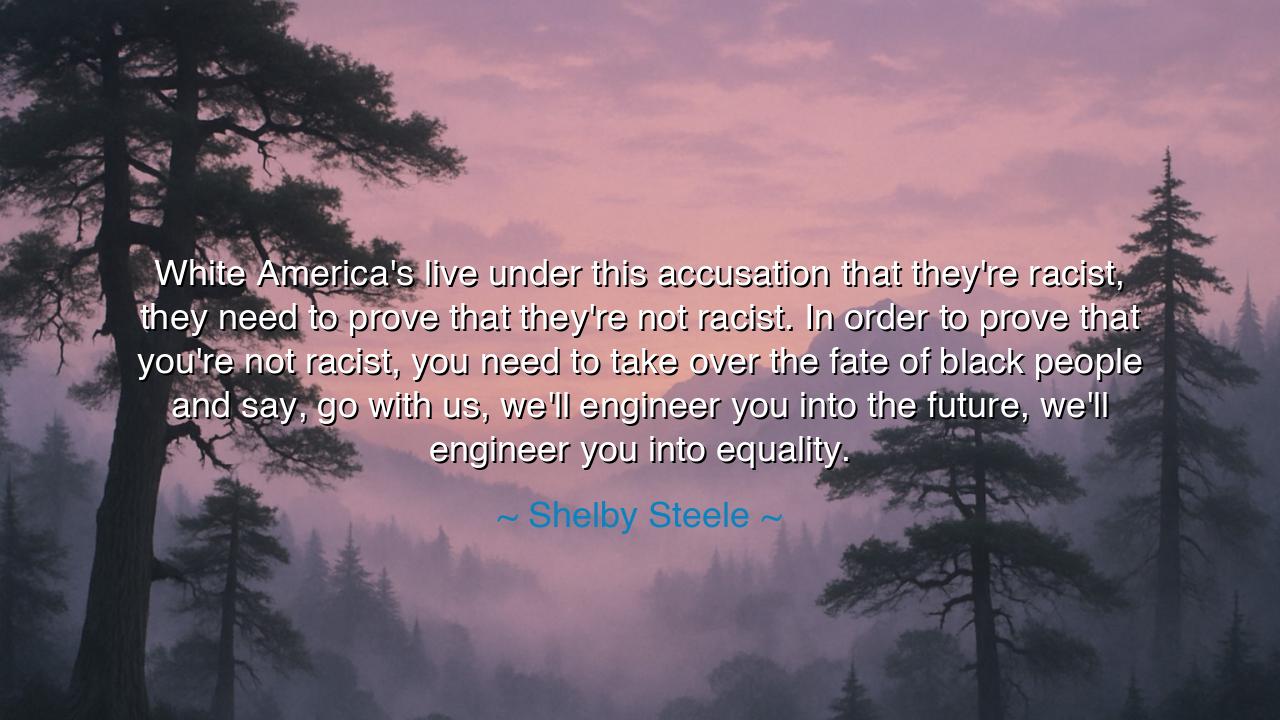
White America's live under this accusation that they're racist
White America's live under this accusation that they're racist, they need to prove that they're not racist. In order to prove that you're not racist, you need to take over the fate of black people and say, go with us, we'll engineer you into the future, we'll engineer you into equality.






In the vast tapestry of human history, the struggle for equality and justice has often been shaped by the complex interplay of power, identity, and moral responsibility. Shelby Steele’s words offer a piercing critique of how white America, grappling with accusations of racism, seeks to respond: “White America's live under this accusation that they're racist, they need to prove that they're not racist. In order to prove that you're not racist, you need to take over the fate of black people and say, 'go with us, we'll engineer you into the future, we'll engineer you into equality.'” These words illuminate a deep truth: the notion of equality is not just a question of policies or intentions, but a matter of power, ownership, and the genuine agency of those who have been historically oppressed.
The ancients were no strangers to the tension between power and moral responsibility. In the Greek city-states, particularly in Athens, democracy was celebrated as a system in which every citizen had a voice, but it was a democracy built on the backs of enslaved people and disenfranchised women. The ideals of justice and equality were largely reserved for a select few. Socrates, for all his wisdom, spoke to the Athenian elite—the landowners and powerful—about the moral responsibilities of leadership, yet the majority of Athenians, including women and slaves, had no say in the political process. In a sense, Socrates’ philosophy and the broader Athenian ideal of democracy were built upon a contradiction: the freedom of the few was predicated on the subjugation of others. Steele's critique of white America reflects this same contradiction—that even in the pursuit of equality, those in power may still seek to maintain control by imposing their own vision of equality upon others.
Steele’s statement digs deeper into the complexity of racial and social responsibility. It suggests that, in attempting to prove their innocence and distance themselves from the label of racism, many white Americans may unintentionally reproduce a new form of dominance—one that seeks to control or engineer the fate of black people, despite their supposed intention to help. This dynamic speaks to the ancient idea of patronage, where the powerful would offer their “protection” to the powerless, but often at the cost of their autonomy. In this scenario, white America—whether intentionally or not—reproduces the systemic power dynamics that have long defined the history of race relations. It is not simply a matter of giving equality, but rather of imposing a vision of equality that might not align with the true needs or desires of those it seeks to uplift.
Consider the story of Abraham Lincoln, who, despite his profound efforts to end slavery and grant freedom to African Americans, often struggled with how best to integrate newly freed people into a society built on racial hierarchies. Lincoln’s Emancipation Proclamation did not immediately grant full equality; instead, it was a first step, followed by a deeply flawed process of reconstruction. Even as Lincoln advocated for the rights of African Americans, he also supported the idea of colonizing freed slaves to Africa—believing that the integration of black people into white society might be impossible. The very freedom he sought to bestow was framed through his own understanding of equality, which did not fully recognize the agency or autonomy of African Americans. In this sense, Lincoln’s actions reflected the tension that Steele describes—an attempt to help, but through a lens of power that may not have fully considered the desires or the needs of those being helped.
This tension between benevolent intentions and coercive control remains prevalent today. Steele’s words remind us that the question of equality is not simply about providing opportunities or resources—it is about respecting the agency of those we seek to help. To impose an idea of equality upon someone, to offer them a vision of the future that is crafted by the privileged, is to risk perpetuating the very systems of control that we seek to dismantle. True equality demands not just the willingness to offer resources or opportunities, but the ability to listen and collaborate in shaping a future that reflects the true needs and desires of all people.
The lesson Steele offers is a sobering one: equality cannot be a tool of the powerful to justify their position in society, nor can it be an imposition from the top down. It requires humility and respect for the autonomy and agency of the oppressed. This does not mean that those with power should remain passive or indifferent, but rather that they should act in partnership with those they seek to help, ensuring that the voices of those who have been marginalized are central in the creation of solutions. It is not enough to give equality; we must allow it to be created by all parties involved.
Let us then take these lessons to heart in our own time. As we work toward a more just and equitable society, let us remember that the pursuit of equality is not a gift given by the powerful to the powerless, but a collaborative process where the voices and desires of those most affected by inequality must be heard and honored. True equality is not about imposing a vision of the future, but about creating a shared understanding, a shared future, where all people have the agency to shape their own destiny. This is the wisdom of the ancients, and it is the path we must walk today if we are to achieve a world where freedom and justice are not just ideals, but lived realities.






AAdministratorAdministrator
Welcome, honored guests. Please leave a comment, we will respond soon